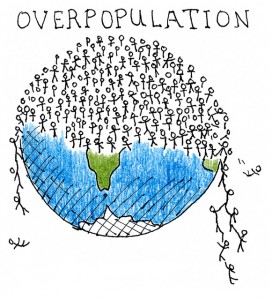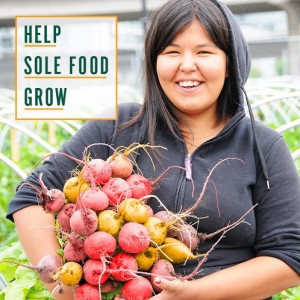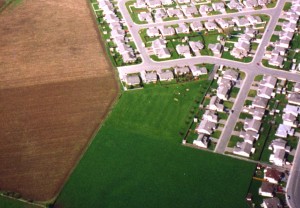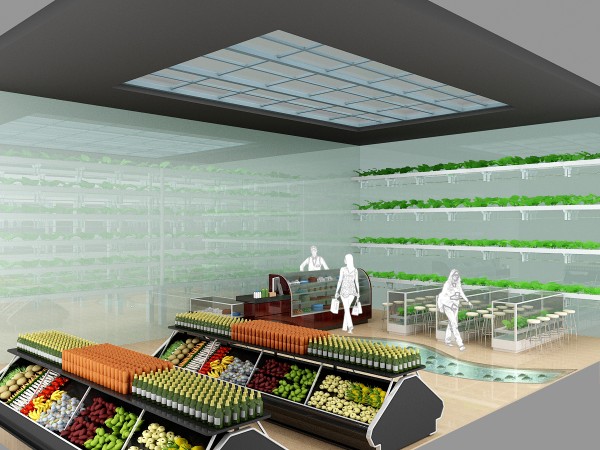 When I talk with people about accessibility to food (a key element in food security) I’m often reminded by them that there are too many people on this planet and not enough food and THAT is the problem. This is “common knowledge” after all. Right? Well actually it’s a more a common misconception. The problem isn’t that we don’t have enough food, it’s that what we have isn’t used very wisely. Continue reading
When I talk with people about accessibility to food (a key element in food security) I’m often reminded by them that there are too many people on this planet and not enough food and THAT is the problem. This is “common knowledge” after all. Right? Well actually it’s a more a common misconception. The problem isn’t that we don’t have enough food, it’s that what we have isn’t used very wisely. Continue reading
Tag Archives: food security
Help Sole Food Street Farms Grow
 Envision individuals with few resources and limited opportunities being given the chance to do meaningful work, help contribute to a community that respects them, and grow lots of healthy vegetables (we know gardening is therapeutic). What a great social enterprise, right?
Envision individuals with few resources and limited opportunities being given the chance to do meaningful work, help contribute to a community that respects them, and grow lots of healthy vegetables (we know gardening is therapeutic). What a great social enterprise, right?
Then garden so effectively in limited space in an urban environment and harvest so much food you can make it available not only to individuals at farmers markets, but also to local restaurants. Lots of them. And do it all in a financially self-sustaining manner. That’s not possible, right? Oh but it is. Continue reading
BC to Lose Agricultural Land Reserve
Did you see the recent Globe & Mail article, ‘Sacrosanct’ Agricultural Land Commission Eyed for Breakup? Yup, there’s talk once again of tossing aside the Agricultural Land Reserve, this time in favour of the Oil and Gas Commission. I’m (almost) speechless at the short-sightedness and glassy-eyed greed of the proposal.
Why, oh why do we keep having to have this discussion? I mean the one about profits for the few in the short term vs. common sense for all for long term.
The Agricultural Land Reserve was the genius of some forward-thinking folks who wanted to protect our prime agricultural land from those with short term, self-interested designs on it.
Up to the 1970’s nearly 6000 hectares of prime agricultural land were lost each year to urban and other uses. The Provincial government responded to the serious erosion of our agricultural land base by introducing BC’s Land Commission Act on April 18, 1973.
A Commission, appointed by the Provincial government, established a special land use zone to protect BC’s dwindling supply of agricultural land. This zone was called the “Agricultural Land Reserve”. Source
Want a little more background?
“The Agricultural Land Reserve (ALR) is a collection of agricultural land in the Canadian province of British Columbia in which agriculture is recognized as the priority. In total, the ALR covers approximately 47,000 square kilometres (18,000 sq mi) and includes private and public lands that may be farmed, forested or are vacant. Some ALR blocks cover thousands of hectares while others are small pockets of only a few hectares. The reserve is administered by the Agricultural Land Commission (ALC), consisting of a chair and six vice-chairs appointed by the Lieutenant Governor-in-Council of British Columbia (cabinet) and twelve regular commissioners appointed by the provincial Minister of Agriculture and Lands.
The ALR was established by the British Columbia New Democratic Party government of Dave Barrett in 1973, when it was considered to be the most progressive legislation of its kind in North America. It was intended to protect valuable agricultural land that has among the most fertile soil in the country from being lost. Despite having been in existence for over 30 years, however, the ALR continues to be threatened by urbanization and the land development industry…
Defenders of ALR policy respond that the province has little arable land, especially of such productivity as exists on the Fraser River delta around Vancouver, and that the ALR protects British Columbia’s important agriculture sector… Defenders of the ALR have been distressed in recent years at what they see as the weakening of the policy, by the designation of golf courses as “agricultural land” and the removal of ALR-protected lands for residential, commercial, and industrial development.” Source
We’ve been at this argument for a long time. Sigh. I get really tired of rehashing old news. And I just don’t understand why people don’t get what seems so obvious to me:
If we pave over all the land that we can grow food on,
where are we gonna get our food from, exactly?
Bringing in food from outside sources isn’t sustainable long term and leaves us vulnerable. We’ve got to think of the big picture, like those guys were back in the 1970’s.
The Ripple Effect of Genetically Modified Foods
You’ve heard that genetically modified food isn’t good, but do you understand how it impacts you and the ones you love? If you’re feeling sick, there’s a good chance it may be your food.
Here’s a primer based on cold, hard facts…
Video from KarmaTube
“A (formerly) twinkie-lovin Texan and successful Wall Street analyst shares the story of one morning’s family breakfast that changed the course of her life, as well as (she hopes) the course of the American food industry. Realizing that her child was allergic to what she had considered safe foods, Robyn O’Brien put her analytical and research skills to work and discovered far more than she’d wanted to about what’s really in the foods we feed our families. This video will have even the hardened skeptics pondering whether their food habits need some tweaking.”
Lack of Food or Lack of Access?
I have a friend who gets mad every time she hears that someone she knows is having a kid. It’s not that she doesn’t like kids. Well, actually, it is that she doesn’t like kids, but it’s also because she believes there isn’t enough food in the world to feed any more people and that it’s irresponsible to breed when there are people on the planet starving.
It seems a commonly held belief that the world can’t support the human population, but I’m not convinced. I’ve come to believe it’s more about access to food than it is availability of food.
Lisa Weasel, author of Food Fray addresses that very subject in a recent interview about genetically modified foods.
“When I was in Zambia I learned that a lot of the food aid issues there are really just transportation issues. The country has enough food but they can’t get it to the people who need it. Issues in India are economic in many cases. The country has enough food but people can’t afford to buy it even if it’s heavily subsidized.”
Read the full article at Cooking Up a Story.
Gardening and Seed Saving to Become Illegal
A place where gardening, eating the fruit of your labours, and saving your seeds is illegal is some kind of bad, B-rated, Orwellian science fiction movie. Right?
Wrong! It’s being proposed in the United States (for real) and (you guessed it) agri-business is behind it. The industrialization of food isn’t just a bad 1950’s experiment that we can easily amend. Big, powerful and heavy handed corporations have sunk their teeth into the profits to be made by monopolizing supply. And they are not going to let go easily, consequences be damned.
If I hadn’t seen this news television clip, I’d be certain someone was pulling my leg with the whole idea.
I don’t like to think of myself as a conspiracy theory kind of wingnut, but what do you say when it starts looking like maybe the wingnuts have got it right? It’s pretty hard to dismiss the video footage as conjecture or fear mongering.
I’m stunned, frankly. The impact of this kind of legislation on individuals’ right to access quality food, and food security in general, is breathtaking. In the bad way.
Learn more about Survive and Thrive, as featured in the clip, and if you have a US vote, you may want to send it over to the Stop S 510 Campaign.
Not convinced that your ready access to quality food is under threat? How about a guns drawn police raid at your local organic grocer? Good grief, what is the planet coming to? Can’t win the War on Drugs? Then switch to a War on Cheese!
Regional Food System Strategy for Metro Vancouver
Help us build a sustainable, resilient and healthy food system in Metro Vancouver.
There are a great many facets to creating a viable solution for food security in our region. To that end, Metro Vancouver is developing a Regional Food System Strategy and is welcoming public input on the Draft Food System Strategy. This collaborative effort aims to create a sustainable, resilient and healthy regional food system.
Become informed about the issues, engage in the discussion, and have your opinions heard by attending one of the upcoming public events. This is your chance to share ideas and solutions in various communities throughout the Greater Vancouver Regional District.
Public Consultation Meetings
6:30 pm – 8:30 pm
Wednesday, November 3, 2010
Delta Town & Country Inn
6005 Highway 17 (at Highway 99)
Delta, BC
Thursday, November 4, 2010
Hotel Royale Ramada Inn
19267 Lougheed Highway (at Harris Road)
Pitt Meadows, BC
Tuesday, November 9, 2010
The Pinnacle Hotel at the Pier
138 Victory Ship Way
North Vancouver, BC
Wednesday, November 24, 2010
Douglas Recreation Centre
20550 Douglas Crescent
Langley, BC
Thursday, November 25, 2010
The Hilton Metrotown
6083 McKay Avenue
Burnaby, BC
Thursday, November 25, 2010
WEBINAR
12:00 – 1:00 pm (Registration required, click here)
A copy of the Draft Regional Food System Strategy and other online options for providing feedback are available on the Metro Vancouver, Regional Growth website.
Don’t delay, your comments deadline is November 30, 2010.
Creating Communities Via Gardening
Two women in East Vancouver have banded together — and brought their neighbourhood together — over the shared efforts of gardening.
Dubbed the “Two-Block Diet,” neighbours Kate Sutherland and Julia Hilton have started a neighbourhood food revolution and with it cultivated a community, barn-raising bond with the people who have joined them. In a busy city with busy lives I’ll bet they would never have otherwise met, despite the fact they all live a stone’s throw from each other.
The Two-Block Diet showcases all that I believe is great about how food brings people together and builds community. Read the full, Vancouver Sun article and be inspired to create your own Two-Block Diet and neighbourhood network.
The only way to get more local than a Two-Block diet is to have a garden in your own back yard!
Locally Engineered vs. Locally Grown
I recently came across a new concept in food production masquerading as a local food solution. The way I see it, it’s just industrialized food from the corner manufacturing plant vs. the one thousands of miles away.
Okay, technically that does make it “local”. Scratch the surface, however, and there’s lot more to the notion of eating local than simple geography.
Here’s a summary of the Agropolis idea:
- Employ robots and technology to grow food
- Utilize GMO’s to improve production
- Use artificial — but, hey, low energy consumption — lighting
- Create a “powerful consumer experience” that’s more funky and far sexier than anything you can find that incorporates, say, dirt
I have so many issues with an engineered version of “urban farming” it’s hard to know where to begin. Okay, not that hard. Let’s start with the list above:
- Robots and technology — Sure, who wants people touching your food
- GMO’s — Absolutely. Hellooo, we can’t have Nature running the show
- Artificial lighting — Brilliant, now there’s no need to rely on the nasty, carcenogenic sun
- Farm “experience” vs. actual farm — Great, it’ll be just like the Disney California theme park; super clean and once you’ve been, you’ll never need to visit the state
The whole premise gets off to a rocky start with the stats Agropolis tosses about to portray food as an enemy of the earth, prefaced by “Food subjugates the earth.”
Whoa, Nellie. Food subjugates the earth? No, more like messing with natural food systems messes with the earth. More like, taking plant-based food that would feed 10 people and feeding it to one cow so a handful of folks can eat steak, that messes with the earth.
The local manufacture of food, while accurate on the geographic technicality, in no way constitutes a farm and misses the locavore boat.
Genuine Food
A big part of eating local is about eating food. Real food. Not a reasonable facsimile thereof, even if it was just picked this morning. I mean food that has soaked up the nutrients it needs and gives us the nutrients we need and then gives nutrients back to the earth when we’re done, in a beautiful, self-sustaining cycle. Just as it has for millennia, well, right up until we started messing with it post-WWII.
Science actually knows relatively little about the complexities of how real food works it’s wonderful magic, but we can see the effects when we behave as if we can manage it better than it can manage itself. Let’s face it, food’s got a huge head start on the evolutionary sustainability track.
Food Security
Another huge part of the “eat local” trend is focused on food security. Unlike the image that phrase initially conjures up, food security is not about locking down food so production is in the hands of a tech-savvy few. It’s quite the opposite. It means opening up the guide book, learning how we can each produce our own food, and creating systems to ensure everyone has secure access to quality food, no matter their income or location.
Forget the pleasure and satisfaction that’s derived from growing your own food, and let’s just look at the value of being able to eat quality food, when you’re hungry, even on a pauper’s budget. Stop. Ponder.
Respecting the Earth
In addition to a desire for improved taste and nutritional quality, embedded within eating local is a recognition that what we’ve been doing to the planet with industrial food production isn’t actually working, and it’s time to clean up our act. That includes growing practices, water conservation, multitude forms of pollution (including pesticides, cattle feedlot waste…), carbon footprint, and a great many other activities not related directly to food at all.
Does re-engineering food’s fabrication help solve the problems re-engineering created in the first place, or just create different ones?
Eat + Local
Eating local is just what it says…and more than the sum of it’s parts. It ripples into every segment of our lives. Food is our lives. We must recognize that humans are part of a system, not the creators of it. And let’s face it, we haven’t exactly earned a bonus for our management skills.
When our food got off track, a great many other things jumped the tracks as well. I’m thinking it might be a good idea to go back to where things started going sideways and begin repairing the damage. Maybe by first figuring out how to fit ourselves back into the greater ecosystem, instead of trying to subjugate the system to humankind.



